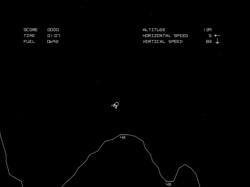Lunar Lander (video game series)
| Lunar Lander | |
|---|---|

Screenshot of the 1979 arcade version of Lunar Lander
|
|
| Genres | Space flight simulation |
| Platforms | Minicomputers, Personal computers, Arcade game |
| Platform of origin | PDP-8 |
| Year of inception | 1969 |
Lunar Lander is the name of several video games built on the same concept. In all variations of the game, the player controls a spaceship as it falls towards the surface of the Moon or other astronomical bodies, and must maneuver the ship's thrusters so as to land safely before exhausting the available fuel. In many versions of the game, the player must adjust the ship's orientation, as well as its horizontal and vertical velocities. The initial version of the game was a text-based game named Lunar, or alternately the Lunar Landing Game, written in the FOCAL programming language for the Digital Equipment Corporation (DEC) PDP-8 minicomputer by Jim Storer while a high school student in the fall of 1969. Two other versions were written soon after by other programmers in BASIC. Lunar was converted to BASIC by David H. Ahl, who included all three versions in his 1973 101 BASIC Computer Games; by the end of the decade, the type of game was collectively known as a "lunar lander" game.
In 1973, DEC commissioned the creation of a real-time, graphical version of Lunar Lander, which was intended to showcase the capabilities of their new DEC GT40 graphics terminals. The game, which was written by Jack Burness and named Moonlander, was distributed with DEC computers and displayed at trade shows. An arcade game version of the game concept was released as Lunar Lander in 1979 by Atari, which featured a fuel-for-money system allowing the player to purchase more fuel to continue their current game. Other versions of the graphical game were released for various systems, including Jupiter Lander for the Commodore 64, Retrofire for Atari 8-bit computers, and Apollo 11 for the ZX Spectrum. Critics have claimed that the text-based version of the game was the most popular computer game of its time, and so many versions of the graphical game exist that in 1981 Electronic Games claimed: "sometimes it seems as though every company capable of copying a cassette is trying to sell a game on this theme."
...
Wikipedia
